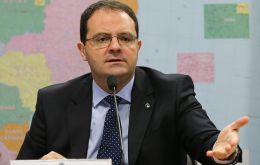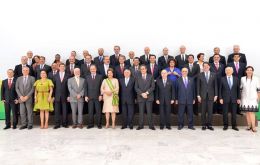MercoPress. South Atlantic News Agency
Tag: Nelson Barbosa
-
Wednesday, March 30th 2016 - 08:32 UTC
Brazil Finance minister disregards calls from Lula for tax breaks and more credit

Brazilian Finance Minister Nelson Barbosa said on Tuesday it is not the time for more tax breaks, disagreeing publicly with former president Lula da Silva's call for fiscal stimulus to revive a moribund economy.
-
Friday, January 29th 2016 - 04:31 UTC
Brazil unveils US$ 20bn credit plan to revive economy; 'raid' on workers' pension funds

Brazil will release 83 billion reais (US$20.4 billion) in new credit from state-run banks for farmers, builders and other businesses suffering in a shrinking economy, resuming stimulus efforts it had largely eschewed in last year's austerity drive.
-
Thursday, January 28th 2016 - 06:49 UTC
Brazil expected to announce massive injection of loans to revive the economy

Brazil’s Finance Minister Nelson Barbosa is expected to announce as much as 60bn Reais (US$15bn) in loans as the government seeks to revive growth amid the worst economic downturn in over a century.
-
Wednesday, January 13th 2016 - 05:06 UTC
Crucial February for Rousseff: economic plan must convince investors and Congress

With her job on the line, Brazilian President Dilma Rousseff is spending January developing an economic plan which she hopes will restore faith in her leadership and weaken looming impeachment proceedings against her.
-
Wednesday, December 23rd 2015 - 10:07 UTC
Brazil's Barbosa insists fiscal policies to shrink budget deficit “will be maintained”

Brazil’s new finance minister, Nelson Barbosa, continued his effort to win over investors on Tuesday reiterating that the government of president Dilma Rousseff will maintain the same fiscal policies intended to shrink the budget deficit and cut debt that were favored by his predecessor.
-
Tuesday, December 22nd 2015 - 14:49 UTC
Brazil's new minister promises the same Levy targets, but fails to convince investors

Brazil's new finance minister sought to reassure investors on Monday as he took the reins of the recession-hit economy, but the Sao Paulo stock market and the Brazilian real both fell. In his first full business day on the job, Finance Minister Nelson Barbosa held a teleconference with international investors, promising to practice the same fiscal discipline as his predecessor, Joaquim Levy.
-
Saturday, December 19th 2015 - 06:39 UTC
Rousseff picks Barbosa as finance minister, a strong critic of Levy and austerity

Brazilian President Dilma Rousseff on Friday picked her close aide Nelson Barbosa, a left-leaning economist, to take over the finance ministry from Joaquim Levy who is leaving after a series of disagreements over economic policy.
-
Tuesday, August 25th 2015 - 20:13 UTC
Rousseff planning to cut 10 of 39 ministries as commitment to austerity

Brazil's government announced on Monday it will slash the number of ministries and reduce its spending, in an effort to show commitment to austerity that could be politically costly for President Dilma Rousseff.
-
Wednesday, August 12th 2015 - 07:30 UTC
Moody's tough on Brazil but also confident on a mid term growth rebound

Moody’s Investors Service cut Brazil’s credit rating to near-junk status on Tuesday but said the country’s coveted investment grade status is safe for now, proving some relief to investors and the government of President Dilma Rousseff.
-
Wednesday, June 10th 2015 - 06:04 UTC
Brazil launches ambitious $64bn infrastructure package to prop the economy

Brazil announced a $64 billion infrastructure spending package on Tuesday, hoping to revive its flagging economy with investment in highways, railroads, ports and airports. Businesses and analysts have long pointed to overburdened infrastructure as a drag on the world's seventh-largest economy, which pays high prices to ship the raw materials it exports.
